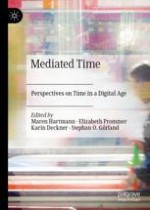2019 | OriginalPaper | Buchkapitel
8. Media Futurism: Time Warps of Future Media Homes in Speculative Films and Corporate Videos
verfasst von : Deborah Chambers
Erschienen in: Mediated Time
Aktivieren Sie unsere intelligente Suche, um passende Fachinhalte oder Patente zu finden.
Wählen Sie Textabschnitte aus um mit Künstlicher Intelligenz passenden Patente zu finden. powered by
Markieren Sie Textabschnitte, um KI-gestützt weitere passende Inhalte zu finden. powered by
